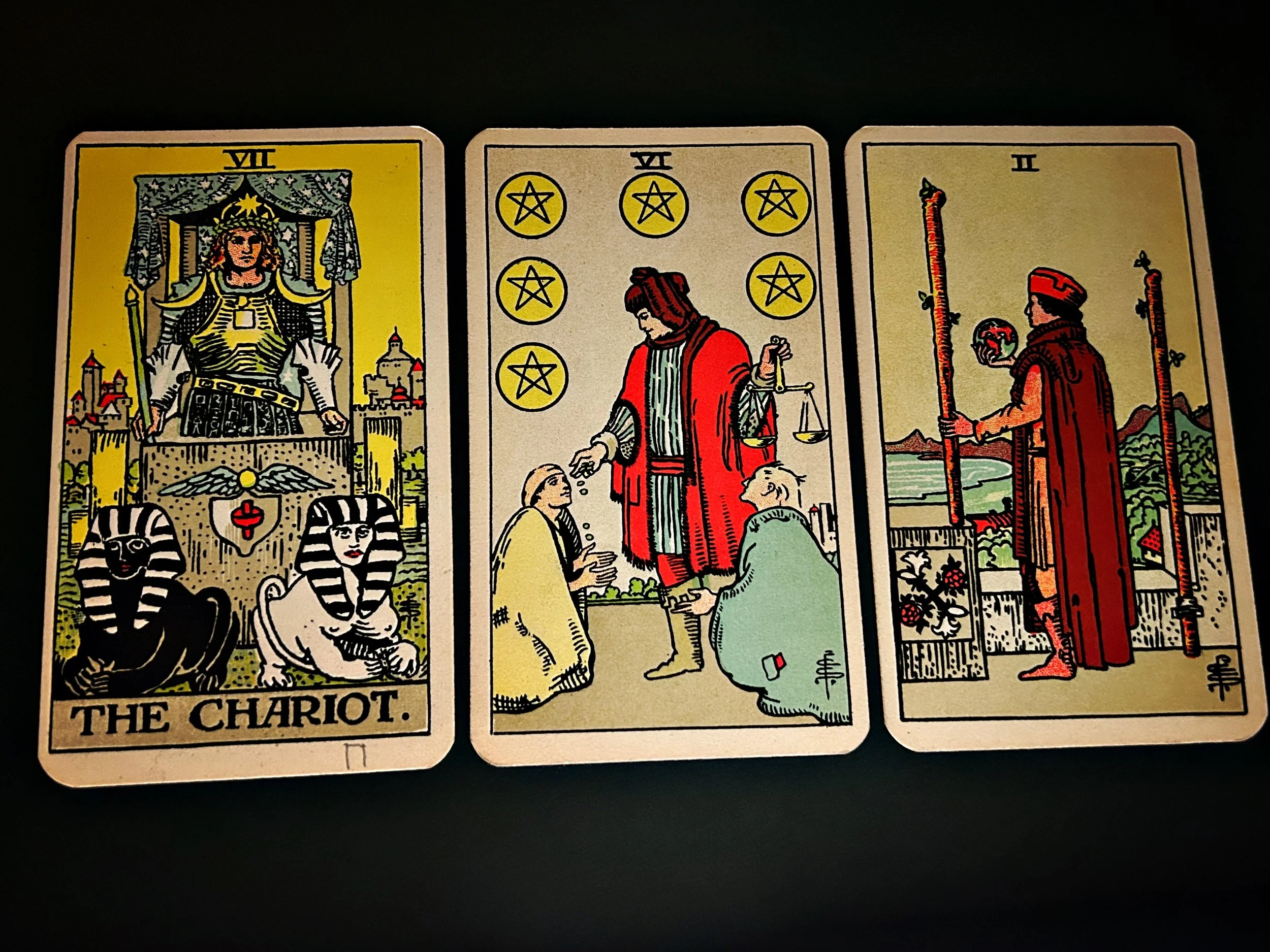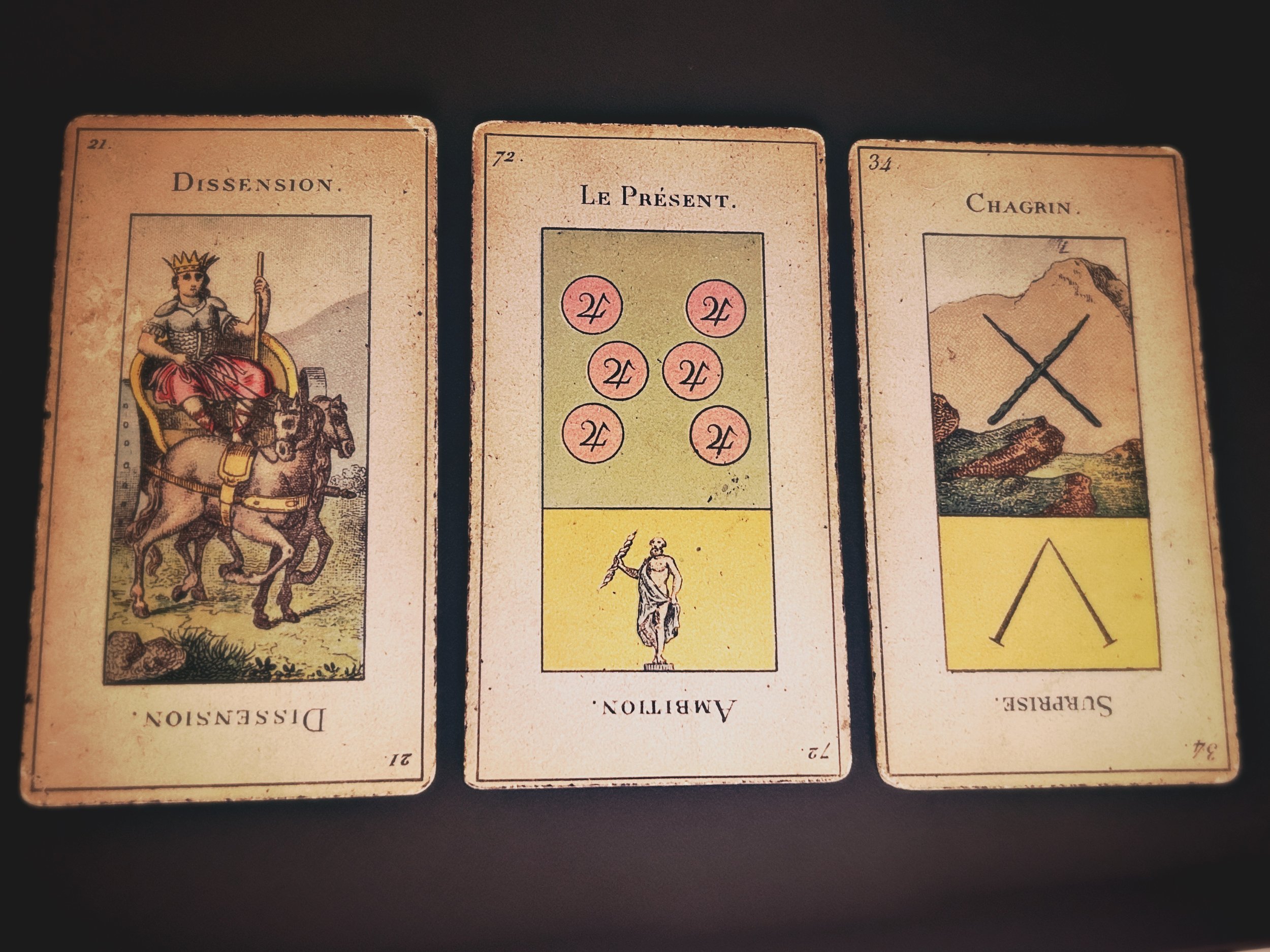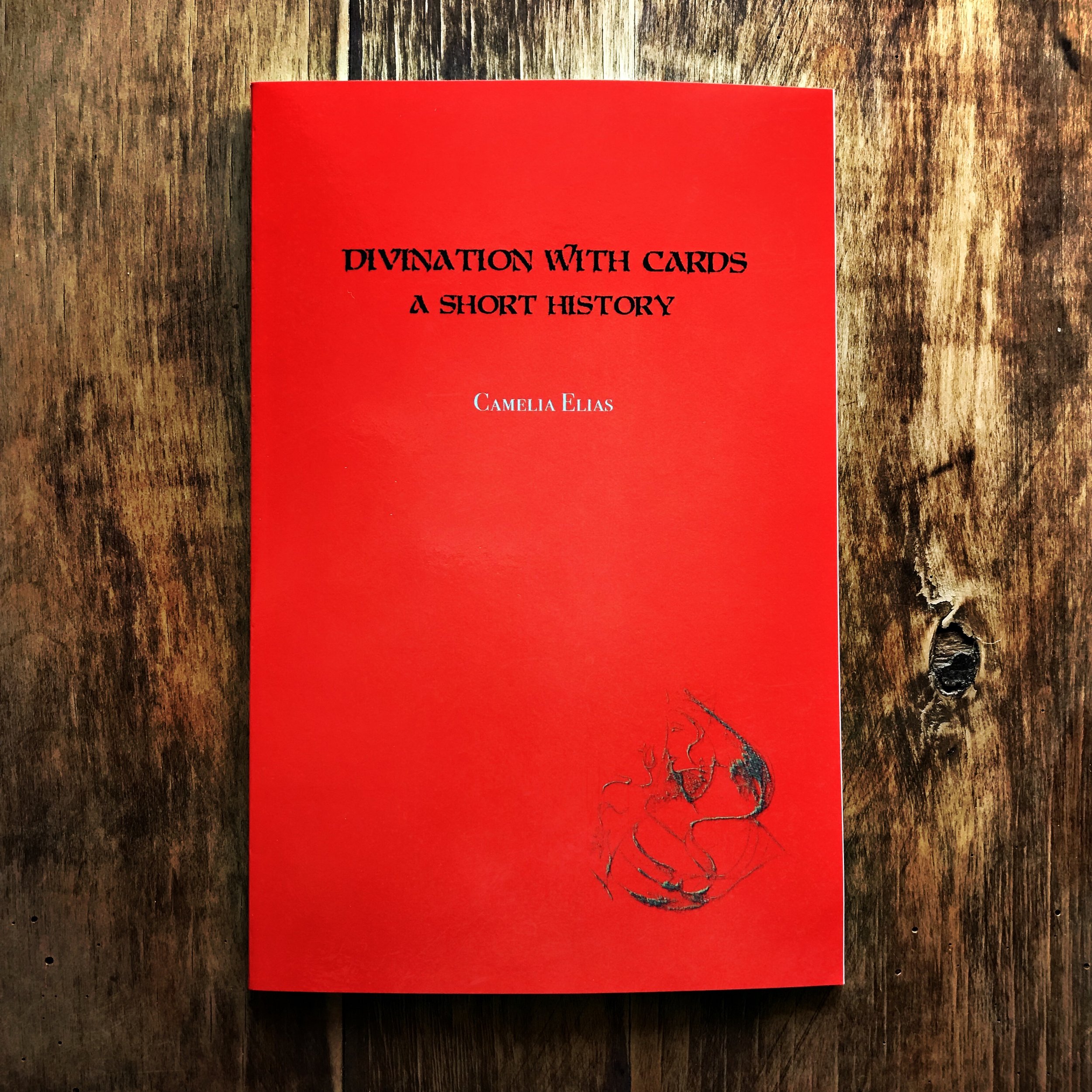A question of Eros
When I launched the course in reading 6 divination decks like the Devil, I was sitting with different decks of cards on my table, writing a practice for the members of this club, when I decided to share this text with the larger audience.
The Marseille, Lenormand, and playing cards are familiar to most here. The Grand Etteilla, the Waite/Smith, and the Thoth tarot are not so familiar to this group, for the simple reason that I myself don’t read with them very often. But I have quite a few renditions of each, some rare and valuable – and I’ve written about them in the past, though I never dedicated a whole book to each, even though I was tempted a few times. I did base my little pocket book, Divination with Cards: A Short History on referencing the Marseille, the Waite/Smith Tarot, and the Thoth Tarot, situating them among the three great traditions.
A question of Eros
Since I was also going through my vast library of reading examples, I came across different variations of this common question: ‘when Eros leaves and we age, what do we have left?’
Just for fun, and in order to see what we might make of this question if we looked at the exact same cards from the three decks that I haven’t as yet read with in this forum, let me compare.
I started with the Waite/Smith Tarot (1910), and then proceeded to look for the same cards in the other two decks, the Thoth Tarot (1943), and the Grand Etteilla (1880) respectively. So the Waite/Smith Tarot determined the 3-card spread for the other two. Let’s look at them individually, and then formulate a question for you to play with.
Waite/Smith Tarot
The Pam-B edition of the Waite Smith Tarot, 1931
I got the Charioteer, 6 Pentacles, and 2 Wands. The first thing that befell me was this: love, hope, and charity, though not in this order. On my table it was more like pride, charity, and chastity. As the Charioteer charges at full speed, with aging he finds himself settled as a merchant and sharing from his gains. His subservient sphinx-horses have now turned into subservient mendicants, his sceptre, now a scale. After everything is said and done and the world conquered, one grows nostalgic, refraining from relationships.
So when Eros leaves, remembrance of things past emerges. If the two wands frame the figure here, they suggest protective solitude, not a portal towards companionship.
Fair enough. No surprises here. When Eros leaves, who has time for seductive games?
Thoth Tarot
The Thoth Tarot, the standard AG Müller edition
The Thoth Tarot is more reluctant to ‘grow old’ and nostalgic. In the image of the Charioteer we find the same abrasive nerve as in the Waite/Smith Tarot, though the knight is here more boxed in, more armoured, his mythical court consisting of 4 horse-creatures too, as against two in the previous deck.
His shield is hot and centered, becoming even more radiant in the next card. Here the 6 Disks are arranged around a star, reminding me of the Arthurian legends, with the knights holding court at a round table. There’s no sense of charity here, only a bursting forth of the Charioteer’s achievements. This card spells it out for us: ‘nothing succeeds like success.’ When Aleister Crowley named this card ‘Success,’ it’s doubtful that he had beggars in mind when he instructed Lady Frieda Harris to paint this card as if a star. In his own Book of Thoth, he exposes his theory, but I’m not interested in that.
Two crossed batons in the third card speak of ‘Dominion.’ In the Thoth Tarot, losing your vitality doesn’t mean losing your supremacy. It’s as if this tarot is no country for old men…
Grand Etteilla
The Grand Etteilla, the Grimaud edition, 1880
What does Etteilla say, having thought of it a few centuries before the other two gentlemen above?
Dissension. Some translate this as ‘arrogance.’ I’m not sure I like it, but fair enough. As this Charioteer is already a king, not a mere knight or general in the army, he may well be arrogant. I don’t see that in this image, though. Quite the opposite. The man’s chariot looks more like the thing that Cinderella used to ride in, around the time when the wheels turned into a pumpkin. Of course, in French, dissension indicates a profound division of sentiments, in other words, a disagreement.
Perhaps this Charioteer is at cross purpose with his own aim. Eros wants to be seen. That’s his ambition, as per the next card – if reversed. Otherwise, we’re here with the present status quo. If you’re a crowned King, you hold a sceptre in your hand, and you ride in a fairytale pumpkin car, then it’s likely you have money. Not necessarily coins you use, but a treasure to behold above your status, above your figure, visually speaking.
And when you grow old, with Eros leaving, what then? Etteilla says, ‘Chagrin’ or sadness, The mountains in your vista will be felt either near, far away, or oppressive. Ageing is your enemy. You may want to bar it with your two sticks, but the surprise will still be on you: two sticks turn into two nails, soon embellishing your coffin. Oh well, so it goes…
The practice
So what have we learnt? We’ve learnt that we can read with any deck whatsoever, like the Devil too. The only condition is that we see what there’s to see, and then let the cards tell the more elaborate story.
You may want to ask your own decks, the familiar and less familiar about your take on ageing, or how you deal with seeing Eros leave you. Even if you’re young, you can experience this.
when Eros leaves you, what kind of a human landscape do you become? Are you with love, hope, charity, or something else? Let the cards tell you.
Enjoy this practice, and if you want more, just join the club.
*
The sublime take
Short but mighty, a reader said of my little pocket book that references the three most successful decks, the Marseille tarot, Waite/Smith, and Thoth tarot





